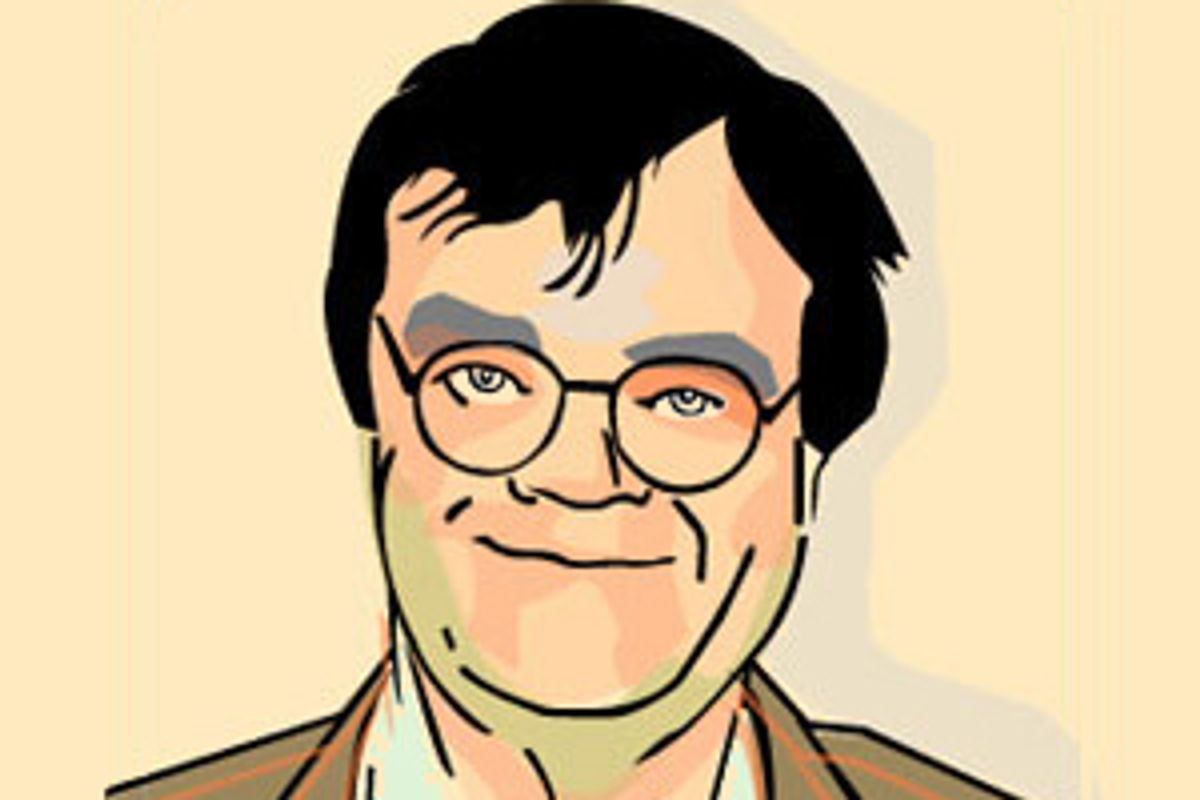It's hard to photograph a falling stock market, so the stories about the big Dow Jones plunge showed solemn-faced traders on the floor of the New York exchange or an electronic news banner in Times Square. The banner (what you could see of it) read, "Stocks Plummet Amid Cred," while in the foreground people crossed the street looking rather unkerfluffed. In other words, the story was illustrated with a picture of the story being reported. Like when your econ professor said, "This is very important," and you wrote in your notebook, "Important."
It is news when the Dow drops 311 points because it strikes a deep gong in the hearts of older guys tending their retirement accounts. Who knows if 311 means anything at all? Traders often look solemn: Their feet hurt and they drink too many martinis. But all over the country, the 50-ish and 60-ish imagine our lives turning into a black-and-white documentary in which nattily dressed men stand in line at a soup kitchen.
I am of a generation that believes in disaster; the younger generation does not. A Harris Interactive poll of Generation Y's feelings about work shows 92 percent want a "flexible work schedule," 96 percent want a job that "requires creativity," and 97 percent want a job that "allows me to have an impact on the world." All I can say is, Wow. Good luck. And now you know why we need illegal immigrants to do the inflexible uncreative stuff that simply needs doing right now. We've raised a generation of young people who want to be writers. Whassup? That's whassup, dude.
In the workplace, the young sit studiously at their screens observing videos of animals doing hilarious things on YouTube. Cats walk into glass doors and fall down, horses in parades relax their bowels and let loose amazing quantities of flop, and meanwhile the old guy in the office down the hall thinks maybe he should start saving tinfoil. He lives in dread of bad news: Northern Grommets will close the plant and shift production to a factory in Guangdong Province, and his position of executive assistant to the assistant vice president will turn to dust. No more free ballpoints for Bob. He sits and broods over his sad fate, meanwhile the young men and women in the cubicles are fascinated by the sex life of gerbils. After work they go to Matt's and drink like the Russian cavalry and get totally blitzed and take a leak in the refrigerator. They are working at Northern Grommets only until Steven Spielberg calls and tells them he is wildly in love with their screenplay. This could happen next week or perhaps in the fall. They are almost 30 but their clocks don't tick yet. Their ship will come and they will buy a house in Pacific Palisades and be driven to the studio every day by Felipe while Maria cleans the house and Ramon does the yard and pool.
I'm one of those old guys, trying to maintain forward progress, sure that if I slow down something will bite me from behind. I think about buying a new suit and then the Dow drops and I think, "Well, that's kind of spendy, isn't it." The old one is good enough. Shiny in the seat but I'll just remember to keep my hands clasped behind my back.
I woke up in New York the morning after the Dow fell (which was good, seeing as how I had gone to bed in New York the night before) and there was a slight chill in the air and it said: Get to work, forget about stocks, be thankful for good health, go do your work. Don't retire -- you would never get the hang of tai chi anyway -- keep shuffling along.
My father was a carpenter and a postal worker. He admired people who came early and stuck with a job until it got done. People who embraced work. His Republicanism was based solidly on that old bootstrap philosophy. Finish your coffee and get to work and let's get this hole dug and don't complain about the heat, it's the same heat for everybody. Stick with the job, rest as you need to, then resume.
The kids surfing and snazzing up their Web sites at work would be aliens to him, and he wouldn't have a lot of sympathy for the gloomy old guy with visions of disaster either. The people most like my dad are the Mexicans coming across the border to work hard and send money home to their families. He would understand those people completely.
(Garrison Keillor's "A Prairie Home Companion" can be heard Saturday nights on public radio stations across the country.)
© 2007 by Garrison Keillor. All rights reserved. Distributed by Tribune Media Services, Inc.

Shares